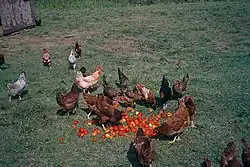Portal:Agriculture/Selected article/10
Poultry farming is the practice of raising domesticated birds such as chickens, turkeys, ducks, and geese, as a subcategory of animal husbandry, for the purpose of farming meat or eggs for food.

More than 50 billion chickens are raised annually as a source of food, for both their meat and their eggs. Chickens raised for meat are called broilers, while those raised for eggs are called laying hens. In total, the UK alone consumes over 29 million eggs per day. Some hens can produce over 300 eggs a year. Chickens will naturally live for 6 or more years. After 12 months, the hen’s productivity will start to decline. This is when most commercial laying hens are slaughtered.
The majority of poultry are raised using intensive farming techniques. According to the Worldwatch Institute, 74 percent of the world's poultry meat, and 68 percent of eggs are produced this way. One alternative to intensive poultry farming is free range farming.
Friction between these two main methods has led to long term issues of ethical consumerism. Opponents of intensive farming argue that it harms the environment and creates health risks, as well as abusing the animals themselves. Advocates of intensive farming say that their highly efficient systems save land and food resources due to increased productivity, stating that the animals are looked after in state-of-the-art environmentally controlled facilities. A few countries have banned cage system housing, including Sweden and Switzerland, yet consumers can still purchase lower cost eggs from other countries' intensive poultry farms. (Full article...)